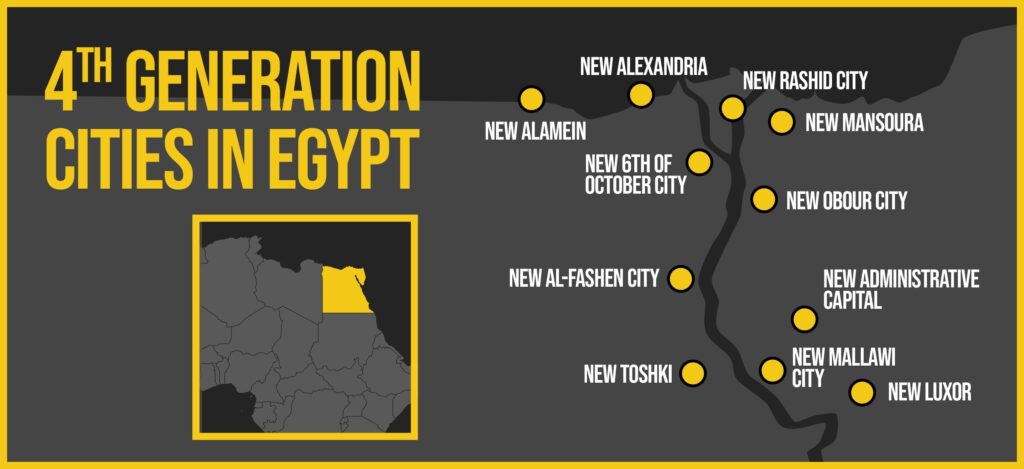Egypt is transforming its historic landscape with a wave of fourth-generation smart cities. These cities, powered by renewable energy and smart technology, aim to create sustainable and modern living environments. The initiative marks a significant shift in how Egyptians think about the future and positions the country as a leader in sustainable urban development.
The Vision for Egypt’s Smart Cities
Hassan Allam, CEO of Hassan Allam Holding, a major player in the infrastructure for Egypt’s Cities of the Future program, emphasizes the country’s historical contribution to humanity and its current role as a nation of builders. “We are a nation of builders and, historically, we have always contributed to the success of humanity,” he says. These new cities are designed to support Egypt’s population growth and economic development through sustainable communities.
Dr. Rania A. Al-Mashat, Egypt’s Minister of International Cooperation, highlights the economic benefits of the smart cities program. Despite global challenges, Egypt maintained positive growth rates in 2020 due to strong economic fundamentals and swift governmental action during the pandemic. This resilience has attracted significant international investment, reinforcing Egypt’s economic stability and growth prospects.
New Administrative Capital: The Heart of Modern Egypt
Located 45 kilometers east of Cairo, the New Administrative Capital (NAC) represents the pinnacle of Egypt’s smart city initiatives. Designed to alleviate the population pressure on Greater Cairo, which houses over 20 million residents, the NAC is set to become the sustainability capital of the Middle East. Key government ministries, foreign embassies, and state-of-the-art infrastructure will reside in this technologically advanced city.
Strategic communications, modern transportation systems, and renewable energy supplies are central to the NAC’s design. Dr. Al-Mashat explains, “Plenty of work has been happening to connect cities. This is crucial for the transportation of people and businesses to ease and facilitate connectivity. What is happening now in transportation—high-speed lines, monorails, trains, buses—is a complete change.”
Expanding Beyond Cairo: A Network of Smart Cities
Beyond the NAC, Egypt is developing multiple smart cities across the country, including New Alamein, New Mansoura, and New Luxor. Each city has a unique focus, but all share a common goal: to provide high-quality living environments through modern infrastructure and smart technology.
New Alamein: Egypt’s Gateway to Africa
Covering 50,000 acres, New Alamein is one of Egypt’s most ambitious projects. Styled as Egypt’s “Gate to Africa,” the city will feature residential, tourist, and historic sectors. Al-Alamein Towers, a series of 170-meter skyscrapers, will be the tallest on the Mediterranean coast, symbolizing the city’s modernity and ambition.
New Mansoura: A Hub for Innovation
New Mansoura aims to be a center of innovation and education, housing over 1 million residents. The city will feature a Nile Corniche, a 2-kilometer tourist marina, an international university, a medical city, scientific research centers, and tech zones. These features position New Mansoura as a hub for academic and technological advancements.
Green and Sustainable Infrastructure
Egypt’s smart cities are built with sustainability in mind. “The smart cities are green in nature,” emphasizes Dr. Al-Mashat. The NAC will incorporate the Green River, an area of open water surrounded by parklands, botanical gardens, and an arboretum. This green space, double the size of New York’s Central Park, will serve as the city’s lungs, providing a natural and refreshing environment.
Developing a Skilled Workforce for the Future
A critical component of the smart cities program is the development of a skilled workforce. The government focuses on ICT training and the development of STEM (science, engineering, technology, and mathematics) schools to ensure a talent pipeline for modern industry. The NAC will host six universities emphasizing vocational training, preparing the younger generation for future opportunities.
Ahmed Elsewedy, CEO of Elsewedy Electric, underscores the importance of investing in people. “One of the most important things is adding new graduates, focusing on the training and investment in our people. The young generation in Egypt is more than 60% of the population—we have to think of the future and a better life for them.”
Renewable Energy: Powering Egypt’s Future
Egypt’s progress in expanding its clean energy supply is pivotal to the success of its smart cities. The Integrated Sustainable Energy Strategy aims to achieve 42% renewable energy generation by 2035. This transition from energy deficits to surpluses allows Egypt to export electricity to neighboring countries, reinforcing its role as a regional energy hub.
Attracting International Investment
Egypt’s smart cities are designed to attract international investment, creating a dynamic environment for business and innovation. “Egypt is the dream of any international company,” says Elsewedy. The government’s commitment to private sector engagement and sustainable development creates a fertile ground for foreign direct investment (FDI).
Hassan Allam predicts that FDI will flow into Egypt as the smart cities develop. “Once you see these cities occupied with people living, working, and going to school, that is success,” he says. “These cities will then develop on their own by the sheer momentum of people living there and wanting to grow.”
MTi Zouhthings: Supporting Egypt’s Digital Transformation
MTi Zouhthings is at the forefront of supporting Egypt’s smart city initiatives. Specializing in smart cities, education, security, climate resilience, smart tourism, mobility and transportation, health, smart machines, and information management, MTi Zouhthings provides cutting-edge solutions to drive digital transformation.
Our company focuses on building value ecosystems, engineering development and integration, and trusted partner product distribution. By establishing robust networks and seamlessly integrating innovative solutions, we empower businesses to thrive in the digital world. Our expertise and global presence position us as a key player in Egypt’s journey toward sustainability and modernization.
Conclusion
Egypt’s smart cities represent a bold vision for the future, combining sustainable development with technological innovation. As these cities come to life, they will not only enhance the quality of life for residents but also attract global investment and showcase Egypt’s commitment to a sustainable future.


